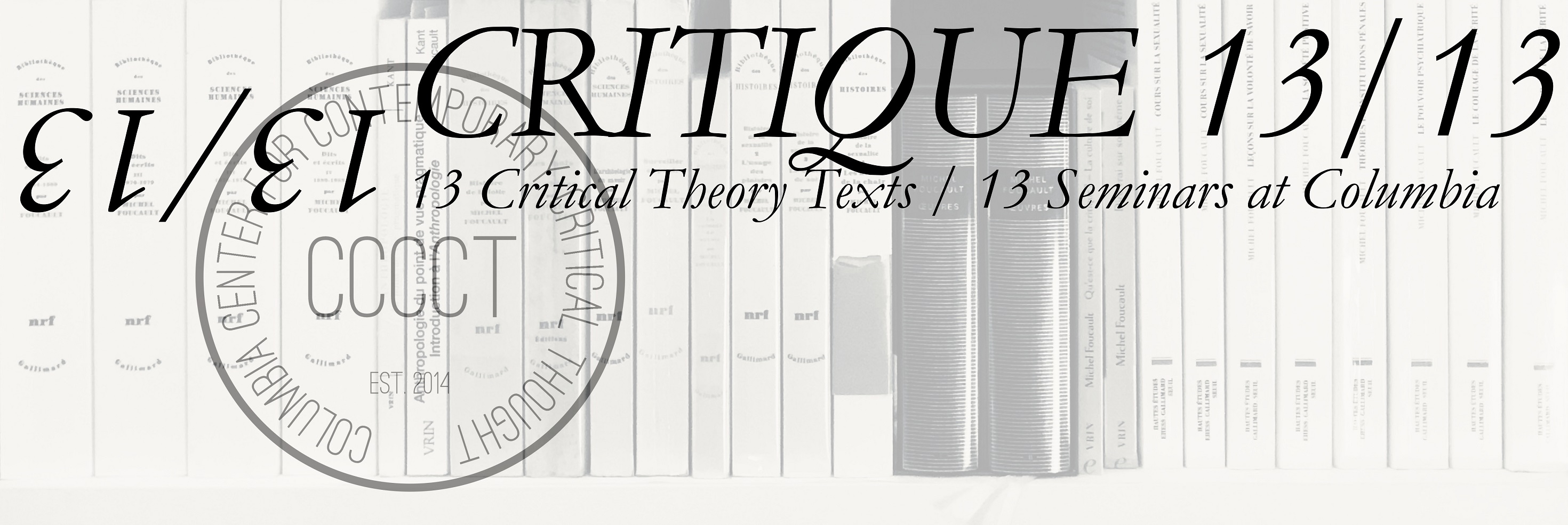By Bernard E. Harcourt
Welcome to Critique 13/13, this year’s new and fifth 13/13 seminar.
We concluded Praxis 13/13 last year with a session on what we called the “space of praxis” with three brilliant critical theorists, Amy Allen, Carolin Emcke, and Heather Thompson. At that final seminar, and in wrapping up our work last year, on critical praxis interventions, I proposed that we should think of this space, our seminar, these 13/13 series, and the field of critical theory, as a “zone à défendre”: as a temporary autonomous zone, one that, indeed, we need to defend.
Defend from the frenzy, and seductions, and distractions of our new reality-TV political life, joined at the hip to a proto-fascist, White Supremacist, New Right presidential politics that, every day, tries to inscribe us into another twisted vortex of hate.
Defend from the false seductions of liberalism, of reformism, of conventional thinking that, in these times of crisis especially, become our fall back position—the safer, more reliable, more reasonable strategies of the middle road.
Defend from the accusations that we want too much justice or are trying to reach too far.
Yes, critical theory and praxis—and this 13/13 seminar especially—is a zone to defend. This space of praxis, here at Columbia University, but also virtually around the world for all those who are participating in this webcast, is a zone to regroup, to rethink, to rejuvenate critical theory and praxis, and—and this is the ambition, the aspiration, the horizon: to change the world. It is only to critical thought and praxis, I would argue, that we can turn to today to address the crises that we face—and they are, today, overwhelming. The crises of neoliberalism and the global grab for the commons that has produced the climate crisis we face. Only critical theory is going to move us forward.
Liberal political theory, legal liberalism, the rule of law—those traditions are what are have gotten us here in the first place. They are what have disarmed us before the onslaught of the New Right. The idea of pursuing your private self-interests first, of retreating to your private realm or personal space, of just going shopping or just consuming, of living your ordinary lives and pursuing your self-interest, on the unfounded or delusional assumption that private self-interest turns into the public good—those liberal ideas have ceded the ground to an onslaught of coordinated reactionary politics. The liberal theories of “private vices, public virtues,” Mandeville’s fable of the bees, the recurring myth of the invisible hand, the illusion of the free market: these are the guiding sentiments of a liberalism that has left us completely unarmed before what I call the American Counterrevolution.
No, it is not liberal thought, nor certainly conservative thought, and not democratic deliberative thought, I would argue, that promises to move us forward. It is contemporary critical theory and praxis alone, because of the values that animate critical philosophy from its inception—the values of equality, solidarity, social justice, and autonomy. Those are the values that guide critical theory and its ambition and desire for human emancipation. This is the only space that is truly committed to those values of equality and social justice.
And that’s why this year, following our last series on Praxis 13/13, and with the very same praxis orientation and action imperative, we are launching this year Critique 13/13 in order to return to critical texts, to reread critical texts, to redeploy critical texts for our critical praxis, for our political interventions.
The praxis orientation is key. Last year’s seminar is the foundation for this year’s. And alongside this Critique 13/13 seminar, the CCCCT in conjunction with the Holder Initiative at Columbia College, Columbia Law School, and ICLS, has just launched as well an Abolition Practicum: “Abolition: A Social Justice Practicum.” We welcome this year Alexis Hoag from the NAACP Legal Defense Fund who is the new and founding Practitioner-in-Residence at the Eric H. Holder Initiative for Civil and Political Rights at Columbia College. Alexis Hoag and our team at the practical engagements wing of the CCCCT will be spearheading seven projects through the Abolition Practicum, ranging from death penalty cases to challenges to parole revocation processes and racial discrimination in jury selection, in a broad effort to abolish not just capital punishment but our larger punitive society.
Accompanying those praxis efforts, the ambition of the Critique 13/13 seminar this year is to return to key critical texts in order to discover new readings, new insights, new weapons, with the ambition to ply them, manipulate them, tear them apart to unearth new critical moves and new theoretical instruments to help us change the world.
I am not sure what the right analogy or metaphor is (or how much it matters): To excavate these critical texts. To dissect these critical texts. To throw these critical texts. To weaponize these texts. To make these texts do new work for us.
What I do know is what we do not want to do: We do not want to wallow in past historical controversies (unless they help us today). We do not want to belabor old and stale controversies. We do not want to simply place these texts in their historical context or do Cambridge readings for their own sake—unless of course that can achieve something for us today. And we do not want simply to instrumentalize them.
We often deride presentism in the academy. We often criticize, especially, historical work if there is an element of presentism. I can understand that, especially when historical work is badly done to serve a present purpose. But there is something valuable in careful presentism that is captured, for instance, in Foucault’s notion of a “history of the present.”
Here, in this Critique 13/13 seminar, in this zone à défendre, we will defend a brutal, violent, aggressive, but careful presentism. If the old historical quicksand that engulfed one of these brilliant critical texts is no longer relevant today—we will discard that.
Our model is brutalist architecture: brutal but careful presentism, for a brutal future space, in light of our brutal crises today. We are in crisis today. We need critical thought. The project this year will be the following: From the perspective of praxis, what can we find in these brilliant critical texts and how can we make them do new work?
Critique 1/13
For the first session, we will explore, discuss, and struggle over the critical method that this brutalist approach, entails. We are going to search for a method. A method to read these texts together this year, to reread Horkheimer and Adorno, to reread Simone de Beauvoir’s The Second Sexand Paulo Freire’s Pedagogy of the Oppressed, to reread Edward Said’s Orientalism, and Audre Lorde, and Hannah Arendt, and Louis Althusser.
But today, first, we discuss what it means to “return” to these texts. We search for a method, to borrow an expression from Jean-Paul Sartre’s Critique of Dialectical Reason, which we will be returning to as well.
I have been confronting this question as I edit Michel Foucault’s lectures at the experimental university at Vincennes in 1969, and his early accompanying works and writings, on Nietzsche. As I have been working and reworking those manuscripts, I have been confronted with the way that Foucault took Nietzsche’s writings as an object of study and plied ideas to his theoretical turns. Almost always drawing on a new reading of Nietzsche’s writings for each twist and turn in his intellectual journey—from epistemes, to the will to know, to the will to truth, to knowledge-power. At each turn, at each pivot, Foucault excavates a new passage or text from Nietzsche to motivate, to animate the intellectual movement.
So I shared, as a starting point for today’s seminar, this draft on what I call “The Illusion of Influence.” And in continuity with our last session last year, I invited Amy Allen to begin our conversation. Her brilliant book, The End of Progress, also does precisely this work, I believe, of rereading to push forward critical theory: To put in conversation the Frankfurt School and the other critical traditions, both the Foucaultian post-structuralist and the post-colonial, critical race, and queer theories, in an effort to decolonize critical theory and simultaneously to criticalize post-colonial theory (see her final coda on page 230). Allen’s approach, I contend, epitomizes a critical method—or at least, that is our point of departure. Let’s get the conversation going.
Welcome to Critique 1/13!

